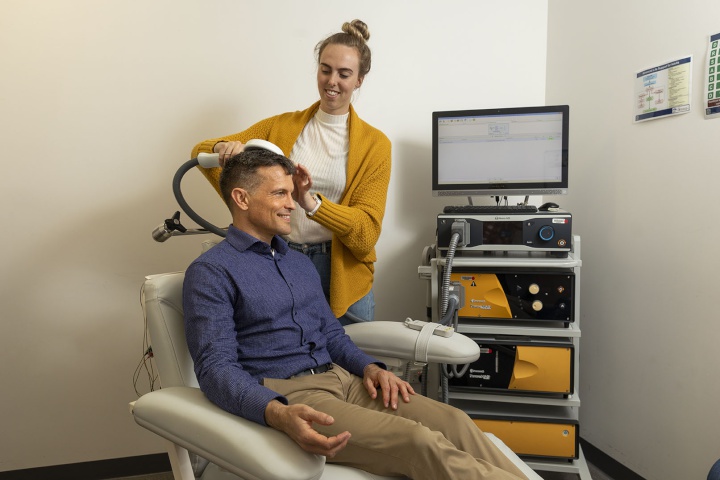Better access to magnetic therapy for depression needed
THURSDAY, OCTOBER 24, 2019
New Zealanders need better access to magnetic therapy for depression

A proven treatment for clinical depression that involves targeting areas of the brain with magnetic energy is under-used in Aotearoa New Zealand, University of Auckland researchers say.
The researchers have demonstrated for the first time in a New Zealand setting that the therapy is well-tolerated and works for some people for whom other, more common treatments are ineffective. Researchers hope their findings, published in the New Zealand Medical Journal, will help make the therapy more available in this country.
One in 20 New Zealanders – 5.3 percent – will experience clinical depression, and many struggle with jobs, relationships and are at an increased risk of suicide. Almost a third (30 percent) do not respond to medication or talk therapy.
Though relatively unknown here, repetitive Transcranial Magnetic Stimulation (rTMS) has been shown to be safe and effective for clinical depression, and has been in wide use internationally for more than 10 years, including in Australia, Canada, the United States and Europe.
Performed in outpatient clinics, it uses magnetic energy to directly target particular areas of the brain. The person experiencing the magnetic energy is fully awake and alert for the entire treatment. Most people tolerate this treatment without any difficulty, and it can be used safely in combination with other therapies.
“Despite all this, and partly due to mental health funding being prioritised for emergency care, this treatment is essentially unavailable to the vast majority of people of people struggling with clinical depression in New Zealand,” says lead researcher, Dr Nicholas Hoeh, in the Department of Psychological Medicine at the University of Auckland’s Faculty of Medical and Health Sciences.
Dr Hoeh was involved in early clinical research with rTMS in the 2000s during his psychiatry training in the US. “The University of Auckland School of Medicine had an rTMS device that was being unused for several years, which was a source of frustration as I worked with many people struggling with depression that wouldn’t respond to treatment with medications,” he says.
The study involved 30 people (16 women, 14 men) of diverse ages, ethnicity, and health status, who all had clinical depression that was unresponsive to drug treatment. They all received a full course of rTMS treatment of more than 20 daily sessions. Twelve responded to the treatment, nine of these achieving ‘remission’, becoming almost symptom-free. Another six participants had a partial response.
“We had a very low drop-out and people tolerated the treatment very well,” says Dr Hoeh. “The vast majority completed the study, which is remarkable given the challenges of fighting traffic to get to the University while struggling with low mood.”
The Royal Australian and New Zealand College of Psychiatrists already recommend having rTMS available as a treatment option for clinical depression. “Hopefully, this study provides an additional impetus for policy makers and funders to expand access of rTMS to this population,” says Dr Hoeh.
The team, which also includes Professor Cathy Stinear, Associate Professor Suresh Muthukumaraswamy, and PhD student Kate Godfrey, will next use EEG and brain imaging to try to identify specific brain changes in people who respond versus those who do not respond to the treatment.
Since the current study was launched in 2016, there has been a further breakthrough in the use of a variation of magnetic stimulation, called intermittent Theta Burst Stimulation (iTBS) for people with clinical depression. This treatment has been shown to be equally effective as rTMS but with the treatment time reduced from 21 minutes to 3 minutes. The team is hoping to also trial iTBS in combination with other newer treatments for clinical depression.
ends


 Hugh Grant: How To Build Confidence In The Data You Collect
Hugh Grant: How To Build Confidence In The Data You Collect Tourism Industry Aotearoa: TRENZ 2026 Set To Rediscover Auckland As It Farewells Rotorua - The Birthplace Of Tourism
Tourism Industry Aotearoa: TRENZ 2026 Set To Rediscover Auckland As It Farewells Rotorua - The Birthplace Of Tourism NIWA: Students Representing New Zealand At The ‘Olympics Of Science Fairs’ Forging Pathway For International Recognition
NIWA: Students Representing New Zealand At The ‘Olympics Of Science Fairs’ Forging Pathway For International Recognition Coalition to End Big Dairy: Activists Protest NZ National Dairy Industry Awards Again
Coalition to End Big Dairy: Activists Protest NZ National Dairy Industry Awards Again Infoblox: Dancing With Scammers - The Telegram Tango Investigation
Infoblox: Dancing With Scammers - The Telegram Tango Investigation Consumer NZ: This Mother’s Day, Give The Gift Of Scam Protection And Digital Confidence
Consumer NZ: This Mother’s Day, Give The Gift Of Scam Protection And Digital Confidence